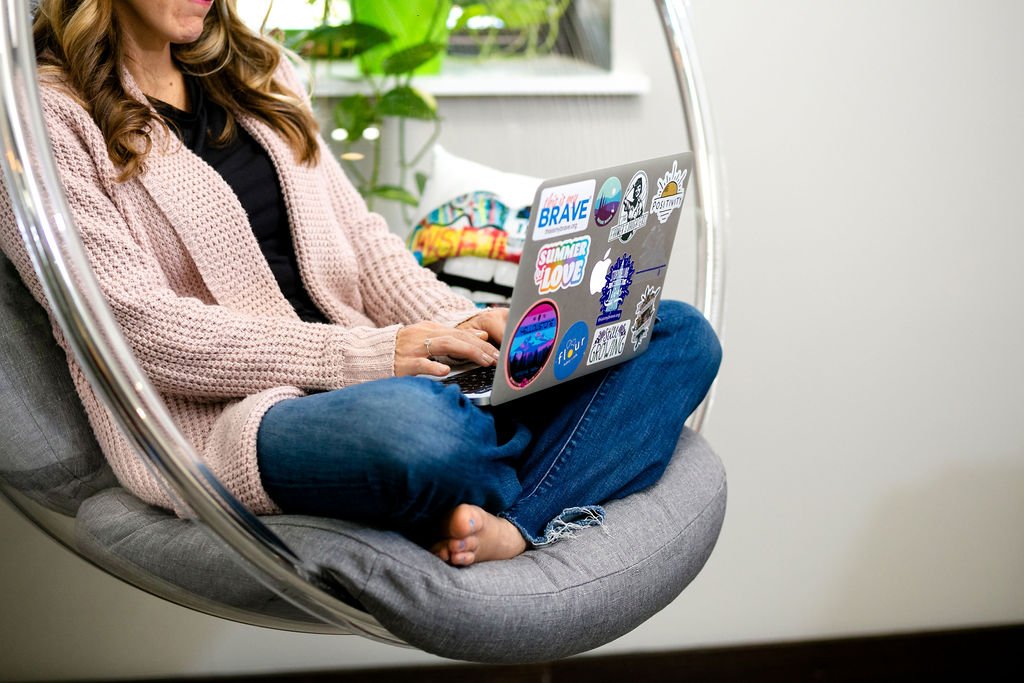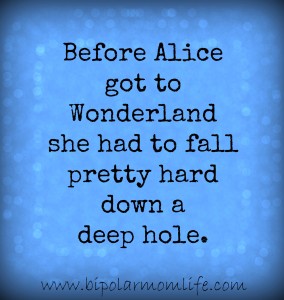If we never make it past the small talk to really open up to a friend or neighbor about our depression, or our anxiety or our eating disorder or whatever it is that we’ve hid for so long because we were scared of being judged, then how would our friend ever be able to love us as who we are?
Read moreThis old blog
Five years, four months of my life is documented on my first blog. My blogging training wheels. When Vivian turned eight months old, I made a decision to tell my story. From the beginning I wanted to write openly, with my real name attached to my writing. But time and again I was advised to stay anonymous. Think of the children, they said. What if a mother of a child in their school finds your blog and won't let their kids play with yours because you're bipolar?
Read moreOur love survives mental illness
When I got married at the age of twenty-four, I never imagined I’d be looking back at our past eighteen years of marriage with the realization that our love has survived mental illness.
But the reality of mental illness is that it doesn't discriminate. Like cancer, it strikes without warning. Like cancer, it’s life-changing. Like cancer, it tests the strength of the important relationships in your world. It's ruthless and heartless, and at times I felt as though I were drowning and I'd never come up for air.
I met my husband when I was nineteen years old. We dated throughout college, even though we attended universities two hours apart. Long-distance wasn’t a piece of cake, but it was doable. Both of us had cars, and the drive wasn’t that bad. Each weekend one would drive to be with the other and when we graduated, we couldn’t wait to live in the same city. It wasn’t long before we were engaged and ready to make it official after having been a couple for four years.
He proposed early one morning, kneeling by my bedside at six in the morning, while I tried to force myself to wake up so I could memorize what he said, the look in his eyes, the magic of the moment. He whisked me away to the Bahamas for the weekend, my fairytale proposal. I remembered thinking at the time, “What did I do to deserve a man like this?” It all just seemed too good to be true.
He chose a beautiful, smart, driven, fun-loving fiancé as the woman he wanted to spend the rest of his life with. He chose me. He didn’t choose mental illness.
He never signed up for this.
Our wedding was perfection, from the good-luck rain which fell as my dad and I ran from our limo into the church where he was waiting for me at the altar, to the dinner and dancing with our friends and family to the luxury hotel room where we peeled off our wedding attire at the end of the night. I took mental pictures throughout the night so as not to forget any detail. It was everything I had dreamed it would be. Only better.
I never imagined two years later I’d be blindsided with a manic episode so severe that four months later I’d be forced to quit the career I had worked tirelessly to develop.
Through it all, my husband’s love never wavered. Even though what happened to me terrified him more than it did me - in the moment I couldn’t comprehend what was going on - he didn’t flinch. Instead, he took control of the situation and made the call for help.
I can still recall the authority in his voice, the strength in his embrace as he tried to coax me to the car so he could drive me to the hospital, and the way he spoke with the EMT’s and police officers with respect and appreciation for their help as they arrived at our house to take me to the psych ward.
He’s been by my side, holding my hand, each and every time mania has overtaken my mind. His arms never tired from hugging me close, his thumbs wiped countless tears from my cheeks so that he could kiss me gently to encourage me to keep my chin up. We took things one day at a time and eventually I found my path to recovery.
But I don’t know how I would have found my way if he wouldn’t have been there to walk with me.
My brother has said before that he couldn't have hand-picked a better husband for me. I couldn't agree more. I am the luckiest girl in the world to have ended up with such a supportive, loving, dedicated man.
“In sickness and in health…” hit us a little sooner than we had anticipated. On this Valentine’s Day, I celebrate how my husband was able to be the light during my storm. Our love was tested and thankfully we made it through, and continue to weather the storm, with flying colors.
Happy Valentine's Day, honey. I love you with all my heart. xoxo
Today marks 6 years blogging
 {sunrise this morning, Bethany Beach, Delaware}
{sunrise this morning, Bethany Beach, Delaware}
Today is my 6-year blogiversary.
I still remember the day I decided to begin blogging about my story. I started a free Wordpress.com blog using a domain name I had purchased. I remember pausing before hitting "submit" on bipolarmomlife.com, thinking for a moment about the brand I was about to create. It was intentional. I wanted other moms out there, other families dealing with bipolar disorder and parenting, to know that they weren't alone and that it does get better. I wanted women to type "bipolar" and "mom" into Google and find me. That's how it all started.
Six years have felt like an instant. My son was only two and my daughter wasn't yet a year old when I started writing out the story of how bipolar had seemingly devastated my life. I was ready to begin writing my way through the pain of my past to heal myself. From my very first blog post:
Bipolar I is my diagnosis but I try not to let the label get to me too much. I definitely think about it on a daily basis, but I’m not embarrassed or ashamed of it anymore like I was back when I was first diagnosed. Sure, the stigma is still there, but it’s beginning to fade.
Each time I took to my laptop to tap out the thoughts and feelings swirling in my head from the memories of my struggle, I chipped away at the internal stigma that had attached itself to me when I was formally diagnosed with mental illness.
My blog was my safe, anonymous corner of the Internet for a year and a half. Friendships were forged from comments back and forth supporting each other's writing, validating each other's pain and progress.
And then an opportunity arose which would change the course of my life. An editor from WhatToExpect.com found my blog and asked me to write for them. It was my first paid writing job, and she wanted me to use my voice as a parent living with mental illness. That was a huge turning point for me. It was when I made the decision to put my name and face on my writing.
I knew that I'd never be able to make the impact on reducing stigma the way I wanted to until I put my true identity on my story.
So I took a risk.
I worried about future employment. I wondered if people would turn away from me. I feared what I didn't know.
I know now there was nothing to be afraid of in the first place.
None of my fears came true.
If I wouldn't have taken the risk to open up about my bipolar disorder, I wouldn't be where I am today. The day I stopped hiding my mental illness was the start to living a richer, more authentic life.
About five months after my first freelance article hit the internet with my byline {What Landed Mom in the Psych Ward was the link bait AOL.com used to tease the article, complete with our family photo}, I launched what would eventually become This Is My Brave, Inc. Only most people don't know that I failed first.
I first launched the concept with a woman I met at a writer's conference. She was lovely and we hit it off instantly, but after working on the idea for a few weeks together, we began to have intense creative differences. The idea was to create a show featuring people who struggled with mental health issues, to provide a creative platform for them to share and end the stigma. We called it, "Don't Call Me Crazy" but thankfully it didn't pan out. {Funny enough, there is now a Netflix series with the same name.}
A few weeks later, licking my wounds, I tried again. As fate would have it, I was introduced to Anne Marie Ames, the woman who would become my Co-Founder, at a mutual friend's party. Within a few months we had launched the concept on Kickstarter and the rest is history. This fall we're putting on our 31st show.
The magic behind This Is My Brave is the lifesaving power of storytelling. It's seeing people who have endured so much pain reach a point in their life when they have some perspective. They are ready to use their voice. I've seen people transform from being a part of our shows and our organization. It's as if a physical weight has been lifted off their shoulders and they can finally breathe. It's freeing to be able to talk about the invisible parts of ourselves out loud. And it shows others they are not alone. That it does get better, and that we're all connected.
If it weren't for this blog, I don't know where I'd be right now. Thank you to everyone who has ever read, commented, shared. I appreciate your support more than you'll ever know.
I Landed in the ER after watching '13 Reasons Why'
Four days ago I finished watching the Netflix series ‘13 Reasons Why’ and drafted an opinion piece which I published Monday morning. The show rocked me to my core. So much so, that I landed in the Emergency Room of my local hospital. This is the story of how and why that happened.
 I live with type 1 bipolar disorder. For those who aren’t aware of the various types of bipolar disorder, Bipolar Hope Magazine is an amazing resource and they have an informative section on their website which describes the types of bipolar and different symptoms. In a nutshell, my type of bipolar disorder means that I lean towards the manic side of the condition. If I’m not careful to protect my sleep, I could find myself launching into a manic episode. It doesn’t happen overnight, rather, over the course of several nights of getting little to no sleep.
I live with type 1 bipolar disorder. For those who aren’t aware of the various types of bipolar disorder, Bipolar Hope Magazine is an amazing resource and they have an informative section on their website which describes the types of bipolar and different symptoms. In a nutshell, my type of bipolar disorder means that I lean towards the manic side of the condition. If I’m not careful to protect my sleep, I could find myself launching into a manic episode. It doesn’t happen overnight, rather, over the course of several nights of getting little to no sleep.
As I mentioned in my opinion piece, I put my mental health at risk by choosing to watch the show. I didn’t know how risky it was to begin watching the show because I’ve been mentally healthy for the past 7 years. The last time I was hospitalized for a manic episode was, ironically, exactly seven years ago this month, when I was 5 weeks pregnant with my second child. I thought since I had been so stable for so long, it couldn’t possibly be that risky to watch a few episodes.
I was wrong.
I started watching the show Friday evening, and got through four episodes (binging) before forcing myself to shut it off so that I could get some sleep before flying to Cedar Rapids, Iowa for my nonprofit’s show the following night. Our Iowa Corridor This Is My Brave show was incredibly moving and inspiring, as all of our shows are, and I was so excited to get to spend time with the show’s producers and cast members afterwards. We went out to a local bar and played Cards Against Humanity while eating and hanging out. I had a blast. But unfortunately didn’t get to sleep until 2am EST, and awoke at 6am Sunday morning. I usually sleep well when I’m on the road, but I had so much on my mind having started watching the show the night before and wanting to continue watching.
I pushed play on episode 5 shortly after waking up, and was able to finish the series in the airport on my way home on Sunday. I was furious by the time I finished, and reached out to several of my friends via text to see if they had watched and to get their thoughts. Everyone seemed to have similar feelings, but slightly different reactions. Overall, the few people I was able to connect with directly were shook up by the show, but were glad it was out and was opening the eyes of the public.
At that point I began thinking about those in my circles who were already vulnerable, sensitive. How would they take it if they had watched? How would teenagers react to the show? Especially if they didn’t have solid support systems in place, if they were already in a tough place, if they didn’t have the energy or resources to access proper mental healthcare.
I landed around 8:30pm and grabbed an Uber home. I normally enjoy chatting with the driver, but on this particular ride I needed to connect with one of my close friends. I called my This Is My Brave Co-Founder Anne Marie Ames. She and I have been friends for four years, and I needed to tell her how the show affected me. We talked the entire ride home, and agreed to catch up again during the week.
My husband had let our kids stay up late so they could see me, so I hugged and kissed my little people and got them tucked in by 9pm. My husband knew how I was feeling because I had called him from the airport, and he knew that I wasn’t sleeping well. The plan at that point was to focus on sleep all week, make it a priority again. On the flight home from Chicago I had jotted down my feelings and initial reaction to '13 Reasons Why', and I told him I felt that if I was able to get them organized into a piece that made sense, I’d likely sleep better. I started pulling my thoughts together, tapping away at my laptop, and he went up to bed.
I crawled into bed around midnight, as it had taken me longer than I had hoped to draft my reaction. But I did feel better once I got it out, so I was hopeful I’d be able to get some quality sleep.
Only, instead of crashing and sleeping hard, my sleep was broken and riddled with nightmares. I woke at 5:30am, and since my husband was already downstairs doing his normal early morning workout in the basement, I grabbed and pen and paper and let my feelings flow again. I shot off a draft of my revised piece to two friends and by then it was time to wake the kids and get them off to school.
I recognized my symptoms of hypomania and immediately told my husband that I was going to call my psychiatrist at 8:30am when they opened to get an appointment. He said that he thought that was a good idea and off my family went to work and school. I normally find relief in the calm of the morning once the house is quiet and I’m on my own. But instead I found myself feeling that familiar current of mania beginning to rush through my blood and anxiety creeping in.
I still hoped I could relieve some of these symptoms by publishing my reaction to the show. I felt a little better after hitting Publish on Medium, but things escalated quickly from there.
I picked up my kids from school and took them out for frozen yogurt, one of our favorite treats. I hadn’t seen them all weekend, so it was fun to catch up. As we were sitting there, Kelly, my best friend from college called to see how our Cedar Rapids event had gone. I told her it was amazing, as all our events are, but that I had a lot on my mind. She caught on immediately that I wasn’t in a good place, probably based on the tone of my voice, but I told her I couldn’t talk because of where we were and the kids were with me. She offered to pick up the groceries I said I’d be running out for later that evening, so that I could head to bed early instead. She agreed to meet me back at my place in ½ hour.
{One of the things Kelly asked was critical for her to know how I was doing mentally, and she knows this from being there when my very first manic episode came on back in December of 2005. She asked me where I was on a 10-point scale. I was at a 6-7.}
When a person with type 1 bipolar is at a 6-7, it means that they’re in a hypo-manic state. A person can very quickly go from a 6-7 to a 9-10, meaning they need to be admitted to a psychiatric hospital, if things aren’t addressed in an urgent manner.
Once we were home, I did my best to summarize for Kel why the show '13 Reasons Why' affected me so deeply. She’s a teacher, and hadn’t heard of the show, but when I told her how I had met a friend of mine for coffee that afternoon, she had a better understanding. The friend I met up with had been directly impacted by suicide, as her son Jay took his life last year, and now the family is pursuing a lawsuit because Jay’s guidance counselor had been alerted by a friend three weeks before he took his own life. The counselor had neglected to contact Jay’s parents. You can read about it in the Washington Post.
Little did I know, Kelly had already set an emergency intervention plan into place, even though she may not have noticed it at the time. While she was picking up the groceries for me, she called my husband and let him know that she was concerned about me. She also texted another one of our close friends from college who had a friend who was a pharmacist. (What can I say? It takes a village.)
When Ben got home, he found the kids happily playing video games, while Kelly and I were sitting in the dining room trying to figure out a plan. I needed Ambien to ensure that I got a solid night’s sleep. The only problem was that I hadn’t used a sleep medication in seven years, so we didn’t have anything (expired or otherwise) in the house. We called my psychiatrist’s office to see if we could get through to an after-hours line. We left a message for my doctor’s medical assistant, but by then it was already 6pm and we were running out of time. We called my regular pharmacy, but my psychiatric medication info was out of date. (Side note: I use a mail-order pharmacy to fulfill my regular mood stabilizer prescription which I’ve been on for the past 7 years at the same dose.) The pharmacist at my regular pharmacy recommended an over-the-counter sleep aid, but we weren’t convinced that would work for me given my level of hypomania.
Our friend who is the pharmacist (in California) communicated by text that if I didn’t have Ambien on hand at home, I would need to go to the Emergency Room to get a prescription for it, and that was what she recommended given my symptoms. I argued it was overreacting, but based on my experience living with this condition for eleven years now, and my past 4 psychiatric hospitalizations for mania, I also knew she was right.
Kelly offered to drive me to the hospital while Ben held down the fort at home. I resisted at first, as it seemed dramatic and unnecessary. I wanted to just get an OTC sleep med, and said we could get Ambien the next day from my psychiatrist. But looking back now, it's a good thing I didn't resist as I could have ended up in handcuffs again, being carted off to the Emergency Room and then the psychiatric hospital. I didn't want my kids to have to see that happen, so I happily went along with the intervention plan.
We joked on the drive over about how efficient my intervention team was and how I was voting her President of the team based on her stellar performance. (In college, Kelly was President of the water polo team and I was Vice President, so it seemed fitting.) We were immediately admitted to the ER, the intake nurse took my vitals, and I was sent back to a triage room with a bed. By that point I had called my parents to let them know what was going on, letting them know the plan and that we had everything under control. They were worried but relieved, and asked that I keep them posted.
The ER doc was really great, and got us in and out quickly with a script for the Ambien that hopefully would do the trick and get me through until I saw my psychiatrist on Wednesday. Ben had called his mom and she was already at our house by the time I was getting my discharge papers, and he met us at the hospital right as I was released so that he could drive me to get my script and Kelly could head home to her family.
Ben’s mom got the kids in bed as I called my parents to update them once we got home around 8:30pm. I ate a little something for dinner, and was crawling into bed by 9:30, ready to let the meds do their trick and lull me into a deep sleep.
Only it didn’t exactly work as planned.
I slept from 10pm until I woke at 1:30am, unable to get back to sleep. Hypomania/mania has a way of doing that to a person. I woke my husband and told him I couldn’t sleep, so I took another dose of the sleep med. I woke groggy at 6am Tuesday morning. Concerned that I had to take two doses, when in the past one dose had worked for me, we called to bump up my psychiatrist appointment, and luckily she had a slot in her schedule for Tuesday afternoon.
My husband was able to take time off from work to drive me to my psychiatrist appointment. We filled her in on everything that had happened, and made a new plan including medication changes. She provided us with her emergency contact info in case we needed it, and answered all our questions. We were in and out in an hour total. My mother-in-law was able to help us with our kids while my husband went back to work for the afternoon and I went to run a few necessary errands, including picking up my new prescription. My therapist (who I haven’t seen since December, because I’ve been “busy”), has an awesome online scheduling tool for current clients. I grabbed one of her only two open appointment slots for Thursday.
Tuesday night we followed the plan. It was extremely difficult to get out of bed Wednesday morning due to the side effects of the medication changes. I haven’t had trouble getting out of bed because of my mental illness for so many years that I forgot what it felt like. It’s hell.
My anxiety has returned due to this “almost-episode,” which is totally normal. It’s just been so long since I’ve felt it that it’s been a little overwhelming. Uncomfortable, yes. Manageable, yes. Especially when I have such an incredible support system and so many resources at my fingertips.
I may have been able to stay mentally healthy for seven years, and yes, that's a long streak. But if this week has taught me anything it's that I'm not immune to relapses. I live with type 1 bipolar disorder and I'll always have it. Like any other chronic condition, it's lifelong. I'll continue to kick bipolar's ass, I know I will. I'm even a little grateful for this week's experience because I had been feeling like a bit of an imposter lately, having not felt symptoms for so long and getting to do this nonprofit work where I hear stories of individuals overcoming mental illness every week. I'll forever be a member of the club, my tribe, as I call it. And together we're ending the stigma surrounding mental health disorders. One true story at a time.
*****
About a year ago, I wrote a guest post for a website called OC87Recovery Diaries, and in it, I stated that we didn’t have a plan. The reason I’m publishing this post is not to highlight how fortunate I am, but to point out how I almost landed in a psychiatric hospital this week, but didn’t, because we had a plan. It may not have been a formal, executed WRAP (Wellness Recovery Action Plan), but it was darn near close, and it worked.
If you or someone you love lives with a mental illness, it's important to have a plan. And if you're in a tough place right now - here are some things I find helpful:
- Know your local and national mental health resources, including the crisis hotlines. This Is My Brave's Resources page is a great place to look, or even just Google it and keep that info handy.
- Make sure you know how to contact your psychiatrist after-hours in case of emergency.
- Keep a journal that lists the meds you're currently taking and what's working for you. Allow those closest to you to have access to this in case of emergency.
- Don't be afraid to be completely honest about how you're feeling. Feeling overwhelmed, triggered, fragile, etc., and sharing your feelings with those you trust is NOT weakness. In fact, it's the complete opposite. It's brave to allow yourself to be that vulnerable and it leads to deeper, more close-knit relationships with the people you love.
- Don't lose sight of self-care. We often get so wrapped up in our day-to-day lives that we forget to take time out for ourselves, and being too "busy" can lead to burn-out and mental health issues.
Mental Health Stories in the news
We're seeing more and more stories of individuals overcoming mental health struggles in the news. Stories of resilience and pride are emerging, as we work to educate society about the battles in our heads, these invisible illnesses that so many Americans live with. I'm overwhelmed with gratitude for the work I get to do each day because I know that by putting our stories out there, we're slowly and steadily giving permission to so many others who haven't yet exposed themselves for fear of being judged. The climate is changing, although we have a long way to go.

More and more we learn about people who have lost their battle with mental illness, and the family members who are telling the truth rather than covering up the fact that they lost the person they loved to suicide. Task forces are being created, families and communities are coming together to force change when it comes to mental health awareness. It's an uphill climb, but we're clawing our way up the mountain.
A few months ago I had the privilege of sharing my story with an incredibly thoughtful and engaging writer. The story came out on June 2nd, on the front page of the Washington Post.
The support surrounding the release of the article was outstanding and so positive.
A month later, This Is My Brave was featured in a 4-page article in O, The Oprah Magazine. Once again, the support flowed in, and tons of interest from individuals all across the US and Canada for hosting new shows for next year.
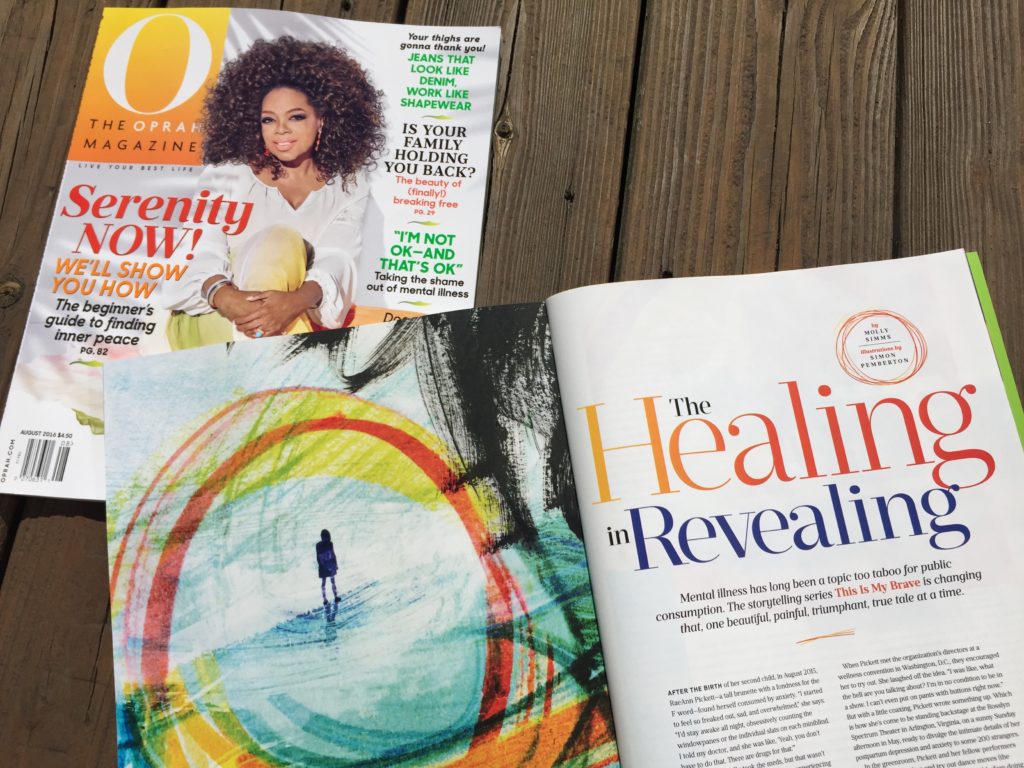
It's been a busy time. As I work with my volunteers and Board members to make the best decisions for strategically guiding our organization forward, I'm also trying to stay aware of my own mental health. I am learning to say "No" to certain opportunities simply because I cannot do it all. Even though I want to be able to get involved on so many different levels with the initiatives being created, I have to protect my health and emotional wellbeing.
When we take care of ourselves first we're able to focus on the important things and tough stuff doesn't feel as heavy.
I make sure to pay attention to signals my body sends me. If I've been at the computer too long, I get up and out of the house. Lately this has been taking the kids to the pool to enjoy the sun and fresh air. I find time each day to turn on an at-home workout DVD and get in 30 minutes of yoga or cardio (just ordered a new Beachbody program that I'm really excited about - Country Heat!). And am counting down the days until our beach trip next week, trying not to stress about the fact that we get home on Sunday and the kids start school the next day.
Life is good.
I will not hide the fact that sometimes I do feel nervous about what the future holds. I can only live in the present, plan for the future, and stay true to what I believe. That our stories provide hope, and by helping to bring these stories into the light we can hopefully be the change we want to see in the world.
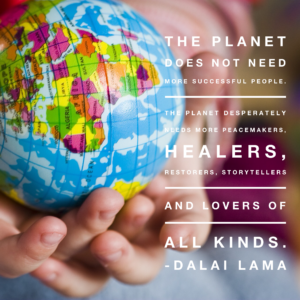
Clarity. We all need to talk about mental illness, celebrity or otherwise
I've been thinking a lot about the post I published yesterday about my inability to relate to Kristen Bell opening up about her anxiety and depression. I don't know why it struck me to write about my feelings, but I wrote them out and put it out there, and the more I thought about what I wrote, the more I began to disagree with myself.
Sure, it's hard to relate to a celebrity because their lifestyles seem so dramatically different from the average person who struggles to pay bills or isn't able to get appropriate mental health care because they don't have insurance. But this lack of being able to identify with a famous person shouldn't have any impact on my appreciation for their ability to share their story about overcoming mental illness and stigma.
I'm sure it took a great deal of courage for Kristen to open up in that interview, the same way our This Is My Brave cast members conjure up a certain amount of bravery to audition for, and then share their stories on stage through our shows.
I'm embarrassed to admit that I think what I was feeling had more to do with envy than of not being able to empathize with a famous person sharing their story of mental illness. I'm envious that a celebrity has a much bigger platform than we do, and therefore when they share their stories they immediately garner a TON more attention than we've seen for all the hard work our organization has done over the past three years.
One of my favorite writers once wrote about envy, and I found myself re-reading her words today. Glennon reminded me today that: Envy is just unexpressed admiration. It’s respect holding its breath.
I constantly need to remind myself that we need to focus on the important work we do and that when the time is right, I'm confident our organization will attract the attention of national media. In fact, it may begin happening sooner than we thought.
This is my life's work now, this work of storytelling. My organization encourages individuals to share their stories to end the stigma. I have no right to say that a celebrity sharing her story is any less impactful than a member of my own community.
Kristen, blog reader Jill, and anyone else I may have offended from my post yesterday, please accept my apology. Thank you to all who join us in the effort to end stigma, celebrity or not.
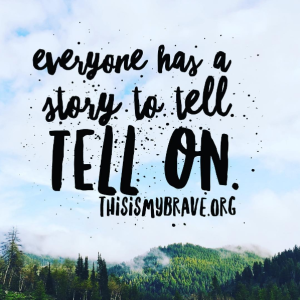
What I Want You To Know on World Bipolar Day 2016
 Today is the third annual #WorldBipolarDay. This day is important to me because it is helping to open up and continue the conversation surrounding a mental illness that is misunderstood in our society - bipolar disorder.
I was diagnosed over ten years ago. My world was turned upside down when I suffered two manic episodes in one month, each requiring hospitalizations. Soon thereafter, I received the diagnosis of bipolar disorder and spiraled into a severe year-long battle with depression and anxiety. I felt utterly alone, scared to talk to anyone about it outside my immediate family. My illness told me I was broken, worthless, and that I'd never get better. I believed it for over a year.
Today is the third annual #WorldBipolarDay. This day is important to me because it is helping to open up and continue the conversation surrounding a mental illness that is misunderstood in our society - bipolar disorder.
I was diagnosed over ten years ago. My world was turned upside down when I suffered two manic episodes in one month, each requiring hospitalizations. Soon thereafter, I received the diagnosis of bipolar disorder and spiraled into a severe year-long battle with depression and anxiety. I felt utterly alone, scared to talk to anyone about it outside my immediate family. My illness told me I was broken, worthless, and that I'd never get better. I believed it for over a year.
But it was lying.
I eventually found the right medication, and I did get better.
But then I got sick again when I was trying to protect my kids. I thought as their mom I knew better. I should have listened to the doctors.
Hindsight is 20/20 though, I had to learn the hard way. I don't regret my decisions. They brought me to where I am right now.
I'm no one special. I'm just a person who was handed a diagnosis, went through a fierce struggle, learned to accept it, and wasn't willing to allow society to intimidate me, judge me, and discriminate upon me for something that wasn't my fault.
I am playing the cards I was dealt, as my favorite author, Cheryl Strayed, has so wisely stated.
You don't have a right to the cards you think you should have been dealt. You have an obligation to play the hell out of the ones you're holding. - Cheryl Strayed
I share my story because I know there are people out there searching for stories of resilience right now. I know because ten years ago, I was one of them. If my story can help just one person understand that they can overcome bipolar disorder, than I've accomplished what I've set out to do.
Never give up. Reach out for help. Your story matters.
My favorite Bipolar Resources:
Bringing Mental Illness into the Light
ball-407081_1280
Rejection hurts. It stings my heart and crushes my soul. When it happens more than I can count on one hand in a matter of three days, well, it makes for a shitty week. Makes me wonder if it's worth all the effort.
This morning I unconsciously pulled a teeshirt out of my dresser drawer. I was immediately reminded of what drives me as I pulled the shirt over my head, stared at my reflection in the mirror. What pushes me to continue on through the no's, the unreturned phone calls, the doubts in my mind.
I've heard these doubts whispering in my head before. They were gossiping amongst themselves, loud enough for me to overhear, when we launched our Kickstarter in 2013. Even when we surpassed our goal, they still kept on chattering through our auditions, rehearsals, right up until I walked on stage with my cast for our debut show. Once our cast took to the podium, one by one, we finally silenced those doubts.
So they've returned, and I'm not surprised. I have to once again focus on our mission, why we came together to raise our voices for the greater good.
The gray tee with maroon block letters I was wearing today is one of my biggest reminders. VIRGINIA TECH. We will never forget.
I often wonder what would have happened if one person would have been courageous enough to have been the net that could have prevented the awful tragedy of April 16, 2007. One person reaching out. One person noticing. One person providing help.
I know it's so much more complicated than that, believe me.
I remember when the news broke, where I was, what I was doing. Shaking. On the phone with my brother, a VT alum. Then my husband, also an alum. Staring at the TV in disbelief.
The power of This Is My Brave lies in the vulnerability of the people who decide to stand up on stage and tell their story through a microphone, or publish their words to our community's blog. We've been through the unthinkable. But we've made it to the other side. We're stronger, better equipped to continue the fight. Ready to make a difference.
We all have our struggles in life. What if, instead of pushing those issues and problems and fear of being judged down deep inside of us, we made a bold move and opened up?
I used to be afraid of people finding out that I have bipolar disorder. But ever since I stopped hiding, I've noticed something huge. The vast majority of the time, the person on the other end of the conversation says, "me too." Or, "someone close to me is suffering from depression," or "my mom/dad/brother/sister/aunt/cousin/etc./etc./etc. has a mental illness."
It's everywhere.
Which is why I won't give up. I won't stop talking about mental illness because we're all affected by it. And I want to change lives by continuing to bring true stories into the light. If just one person is helped by this work, it's all worth it.
Move over insecurity, I have important work to do.
Connections in this heavy life
 Nine years have passed since my life was shattered by depression and anxiety. Tonight, as I sit here typing on my laptop, it's hard to imagine how someone could be suffering so deeply that suicide could seem like the best solution. But nine years ago, I felt the pull to end my life. The pain was too heavy, I couldn't see a future. My world was a mix of meds, doctor’s appointments and therapy appointments. Repeat, repeat, repeat. Just trying to get out of bed in the morning was a monumental feat each day. I couldn’t see hope. I was blinded by my depression. I thought maybe it would be easier to just stop living.
Nine years have passed since my life was shattered by depression and anxiety. Tonight, as I sit here typing on my laptop, it's hard to imagine how someone could be suffering so deeply that suicide could seem like the best solution. But nine years ago, I felt the pull to end my life. The pain was too heavy, I couldn't see a future. My world was a mix of meds, doctor’s appointments and therapy appointments. Repeat, repeat, repeat. Just trying to get out of bed in the morning was a monumental feat each day. I couldn’t see hope. I was blinded by my depression. I thought maybe it would be easier to just stop living.
Fortunately I didn’t sit with those thoughts alone for too long. I was completely ashamed of having those feelings, but something inside me begged my heart to tell my husband and my parents. And so I did. They fought like hell to get me back from the ledge. I do know how lucky i am to have the support system which surrounds me.
My heart breaks for the families and friends of these victims of mental illness. We have so much work to do.
In our day-to-day activities, even simply looking people in the eye and smiling can make a huge difference in someone’s day. You might be the only person who noticed them. We’re so attached to our devices that we barely look up anymore and connect with the people in front of us. I’m totally guilty of it too, but we can change.
We Need Universal Mental Health Screening for Women Having Babies
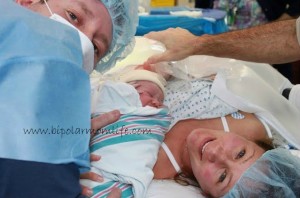 I experienced both a postpartum mood disorder (postpartum psychosis) and a perinatal psychiatric issue (a manic episode which led to psychosis) very early on in my second pregnancy. I had been diagnosed with Bipolar Disorder two years before my husband and I decided to start a family, and yet I found limited support and information in my quest to have as healthy a pregnancy and postpartum experience as I could. When I think back to that time in my life, I strongly believe that if I had received better screening - particularly after my first pregnancy - much of the trauma and heartache of what I went through could have been avoided.
I experienced both a postpartum mood disorder (postpartum psychosis) and a perinatal psychiatric issue (a manic episode which led to psychosis) very early on in my second pregnancy. I had been diagnosed with Bipolar Disorder two years before my husband and I decided to start a family, and yet I found limited support and information in my quest to have as healthy a pregnancy and postpartum experience as I could. When I think back to that time in my life, I strongly believe that if I had received better screening - particularly after my first pregnancy - much of the trauma and heartache of what I went through could have been avoided.
Before I experienced mental illness on a personal level, my ignorance of the various forms of psychiatric conditions caused me to judge people whose stories were covered in the media. I remember watching news coverage of the Andrea Yates trial thinking HOW COULD THAT HAPPEN? And then it happened to me seven years later. Thank God my outcome was drastically different.
Just this week a pregnant mother and her three children were rescued in Daytona Beach, after she drove the family minivan into the ocean. A family member had called police hours earlier to express concern over her strange behavior, including talk of demons. On the 911 tapes, you can hear the sister request a well-being check because "she's like having psychosis or something."
This woman literally saved her sister's life, the lives of those three children and the life of her sister's unborn baby with that call for help.
They were lucky to have avoided an outcome similar to that of the Andrea Yates case. Simply because someone close to the person who was suffering took action.
Now it's our turn to take action. There is an urgent need for changes in the way we screen women during pregnancy and postpartum in order to stop incidents like these from ever occurring in the first place.
Maybe this woman's sister recognized what her family member was going through because of the increase of more open dialogue about women's mental health issues. I can feel the wave of mental health awareness gaining momentum and hope that very soon there will be less ignorance out there and more acceptance. Because together we can make a difference.
Which is why I support this important White House petition to create mandatory universal mental health screening for pregnant and postpartum women. Did you know that suicide is the leading cause of death for women during the first year after childbirth? Or that 1 in 7 women will experience a mood or anxiety disorder during pregnancy or postpartum, yet nearly 50% remain untreated?
We need change. We need to screen every mother, every time to prevent and treat perinatal mental illness.
Recovery is possible - I am a perfect example of this. But wouldn't it be incredible if in the future we could catch cases like mine before they escalate? Before they lead to suffering and even death? No woman should have to suffer in silence because she's afraid to admit what she's thinking or feeling. We need to provide her with the chance to find recovery early. We need to recognize the signs and symptoms and take action.
Please take a moment to sign the petition: Every Mother, Every Time. Creating a WhiteHouse.gov account takes only a minute and there are simple tools to share the petition on Facebook and Twitter once you have submitted your signature.
This movement will save lives. We need 100,000 signatures to get the attention of the Obama Administration. Let's come together to make our voices heard on this critically important issue.
Every Mother, Every Time.
Tweet about the petition with the hashtag #EMET:
[Tweet "Universal mental health screening 4 every pregnant & postpartum woman http://ow.ly/uho8X. #EMET"]
Thank you for helping to spread the word.
My Last Visit to the Psych Ward
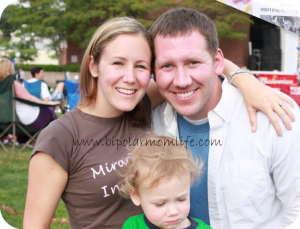
I noticed that the flowering plant on the counter of the open nurse's station had withstood my incessant plucking, as it still had about a dozen blooms, by some miracle.
“She loves me. She loves me not. She loves me.” I debated, pulling at the tender petals of a flower I had stolen late into the night on my evening of admittance. “I know it’s going to be a girl. But what will she name it?” I mused to myself out loud, lost in the psychosis which my pregnancy had spun me into.
Later that night, or maybe it was the following morning, one of the nurses tried to get me to eat. “You need to eat something, sweetheart. For the baby. Here, try this,” she urged, shaking the small box of Apple Jacks she had brought from the kitchen down the hall. We were in my sterile little patient room, a desk between us. She sat in a chair across from me, attempting to coax me into taking a few bites, as I sat in another chair, shaking, sweaty and weak from exhaustion. A small container of milk was ripped open on one side to form a drinking spout, but hadn’t been touched. I felt a little like Alice in Wonderland, staring at the items in front of me labeled "Eat Me" and "Drink Me."
I may have taken a few bites, a sip of milk, but my mind told me she was trying to poison me. I made sure not to eat or drink too much, for fear of never waking up.
Eventually I did decide to lie down and rest on the stiff single bed with the scratchy white sheets in the far corner of the room. No one slept in the other bed in the room. I had my own private room. Good thing, too. I needed to just sleep, to dream off the mania. It had taken two days of the nurses pumping me with antipsychotics until I finally relaxed enough to sleep.
I emerged a day later, after a long, hard sleep, to “meet” the other crazies in the day room. I might have met them a day or two earlier, but my memory was a slice a Swiss cheese when I was manic, so I didn’t remember. Two did stand out, though.
Tony was a big, burly Italian guy who chain-smoked and had the cough to show for it. He was warm and engaging, and I liked him immediately. He made me smile with his obscene jokes, a welcome escape from the situation we had all found ourselves in. Tony was constantly searching for a number in the phone book. When he wasn’t in the smoker’s lounge, he was on the phone pleading with the person on the other end to come pick him up.
Mary had left the day before. She was young like me, and claimed she was also very early pregnant, although I didn't believe her. Hell, I didn't even believe I was five weeks along. We had promised to keep in touch, but I knew there was no way I’d live up to my end of that deal. I didn’t like to take hospital memories home. Art therapy projects were an exception. Nothing like a glimpse into a mad mind for old time’s sake. So instead of giving her my number when she wrote down hers for me, I hugged her goodbye, telling her it would be too painful. She understood.
The exercise lady arrived in the afternoons, swooping in to lead the patients in yoga or dance sessions in the day room. She’d turn on 80’s pop music and we’d bop around, forgetting about the frustrations attached to having lost touch with reality. During those moments, everything seemed to disappear and for three minutes I was okay. Hips swayed, eyes closed softly so I could really feel the music. But as quickly as her sessions began, they were over, and we were back to waiting for our next activity to pass the time until we’d see the outside world once again.
Held for forty-eight hours of insanity, twenty-four for the meds to really start kicking in, and another forty-eight and I was good to go. A final meeting with the staff psychiatrist and I was given my ticket out of that joint. It had been my fourth stint in a psych ward, and it was a house of medicine I was hoping not to have to visit again for a very long time, maybe even never.
Ready to get back to my own home, to my family where I’d be nursed back to complete health so I could get back to being the kick-ass mama and wife they loved. This last visit to the psych ward solidified my commitment to staying well. For myself, for my husband and for our son and the unborn baby I was carrying. Not another day would pass without that little salt pill sliding down my throat before bed. My family deserves this promise. And they’ll get it, forever and ever.


